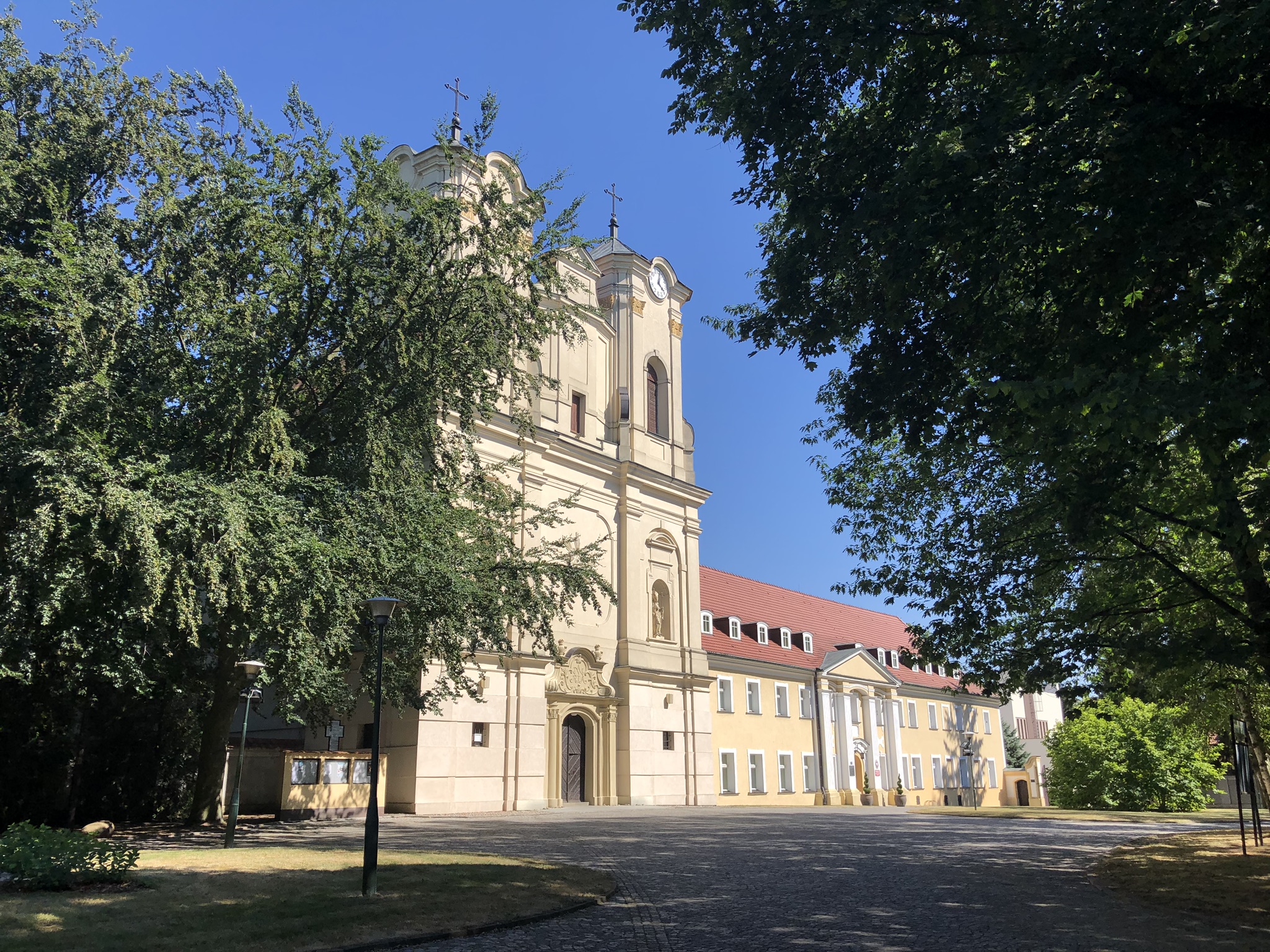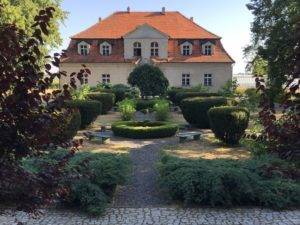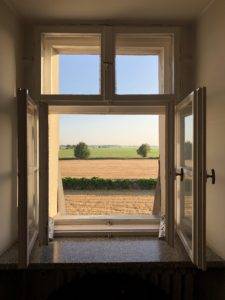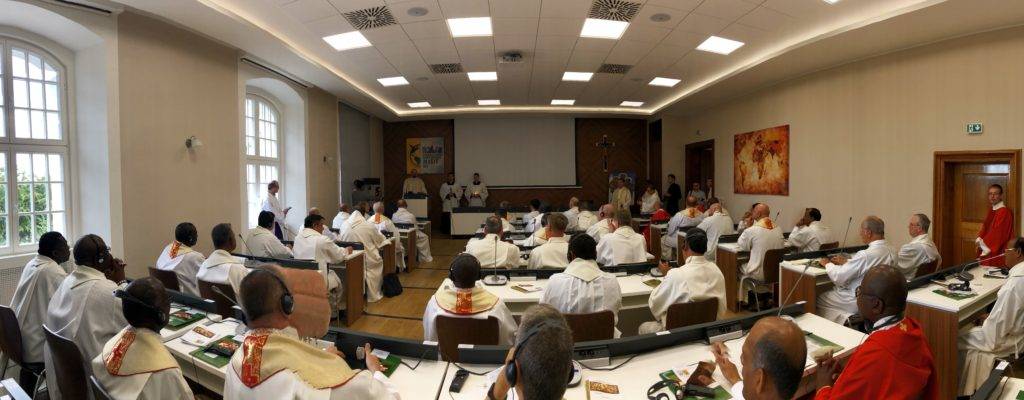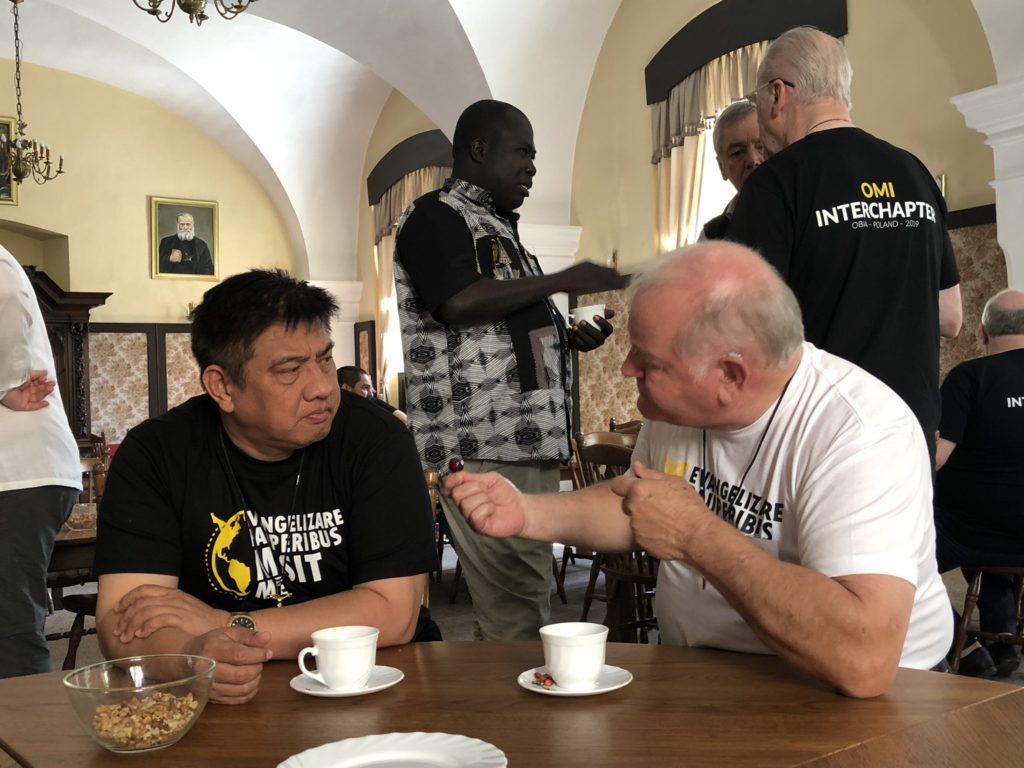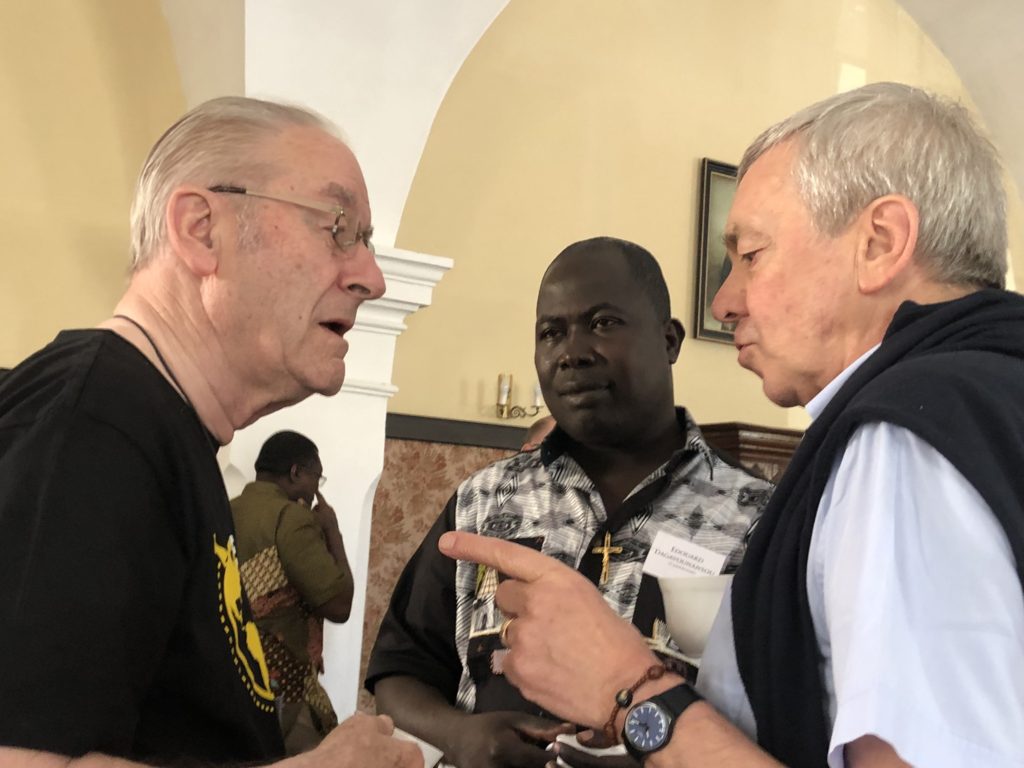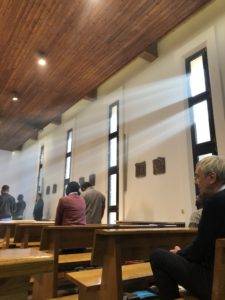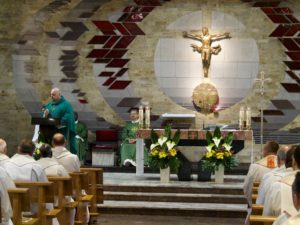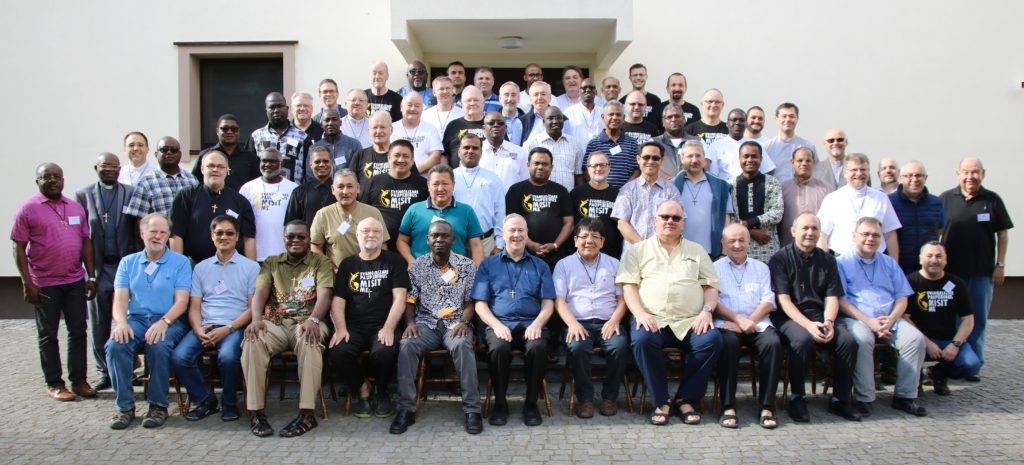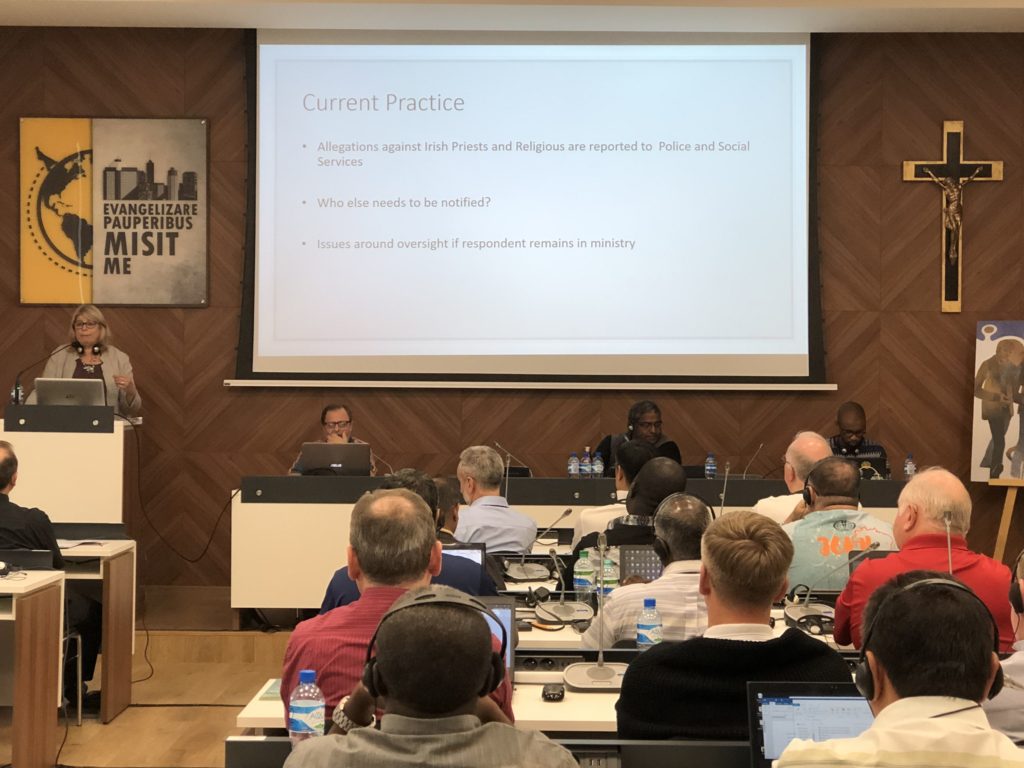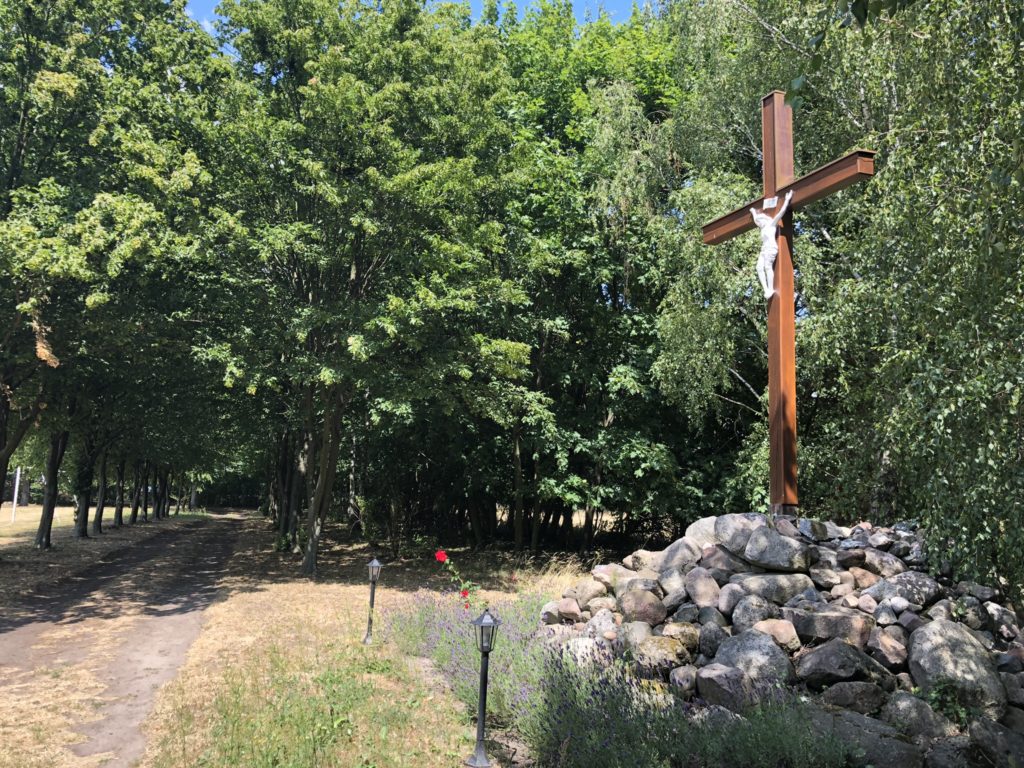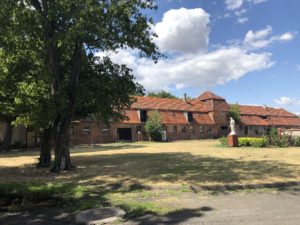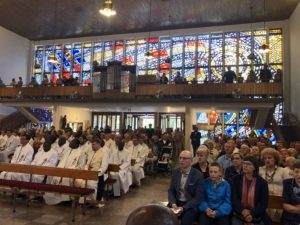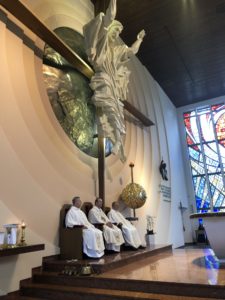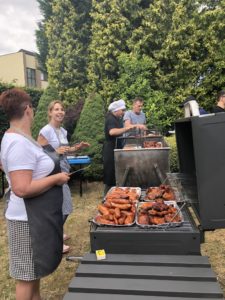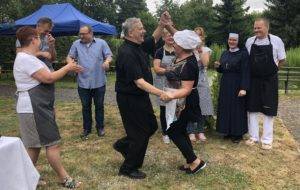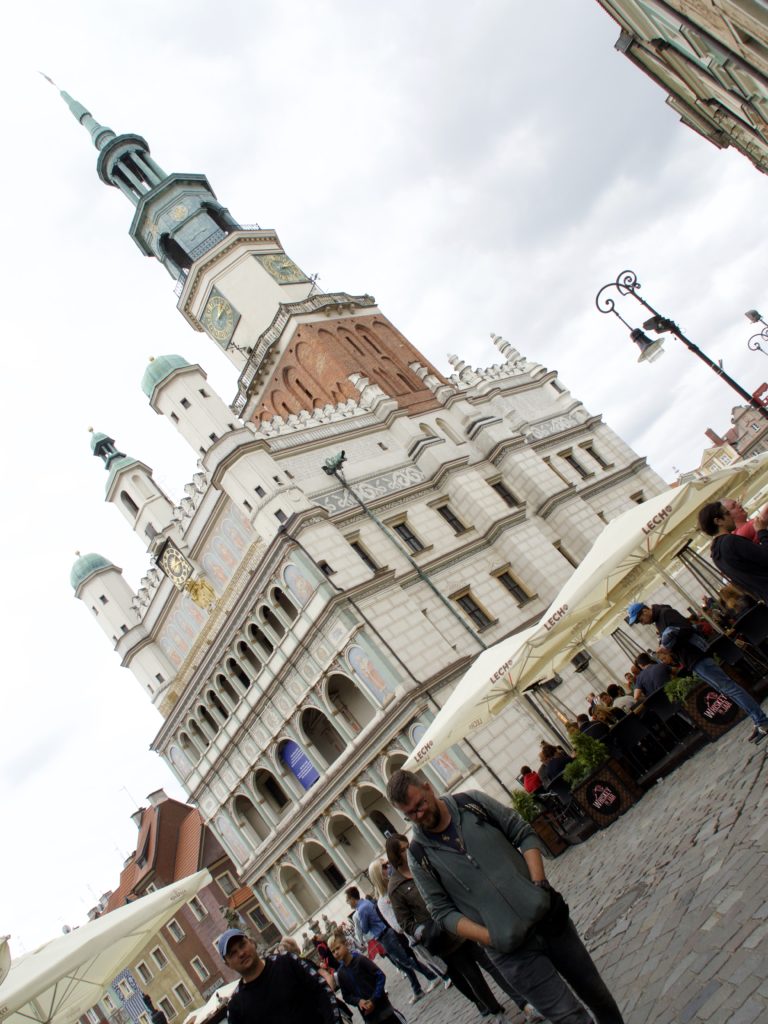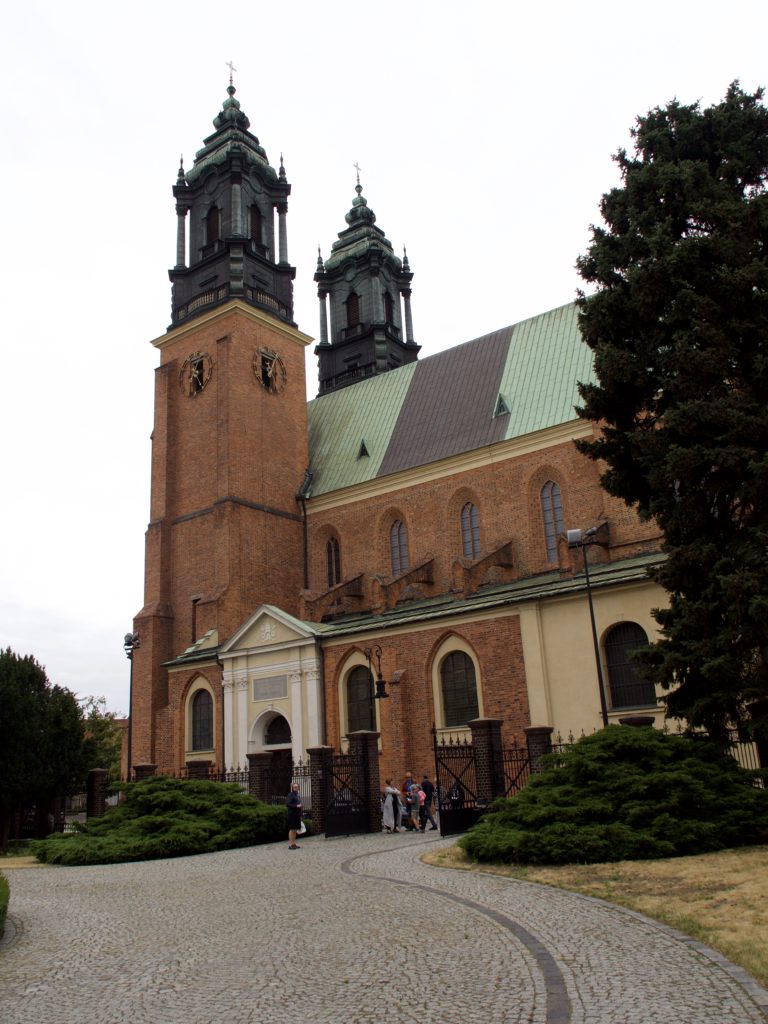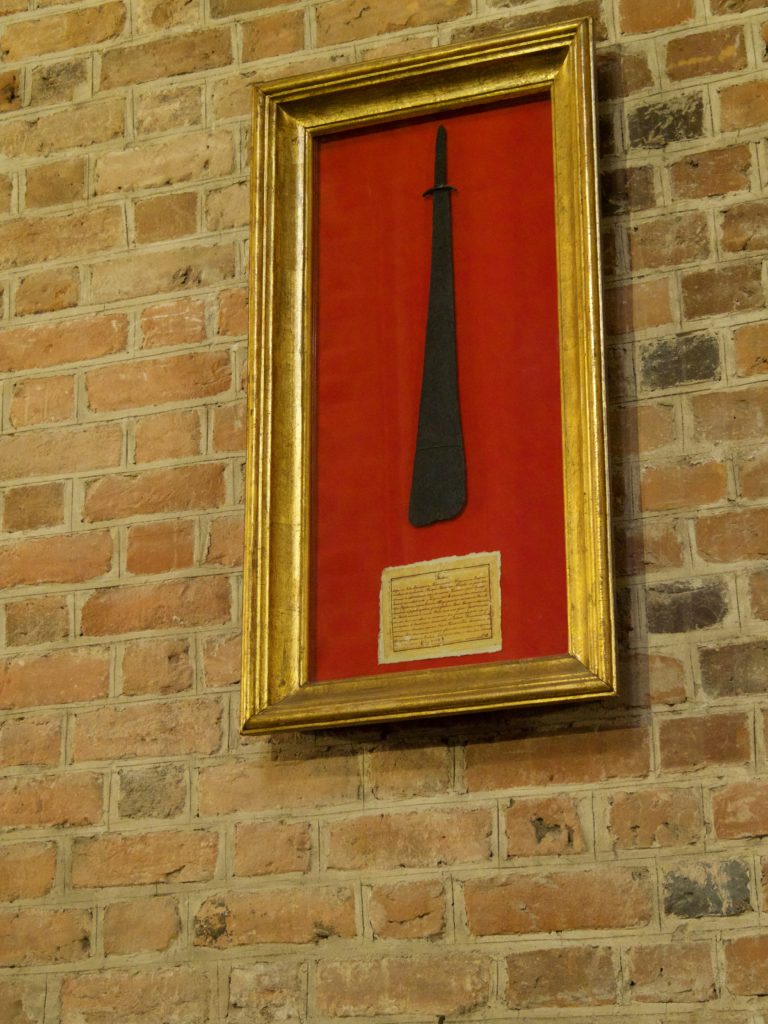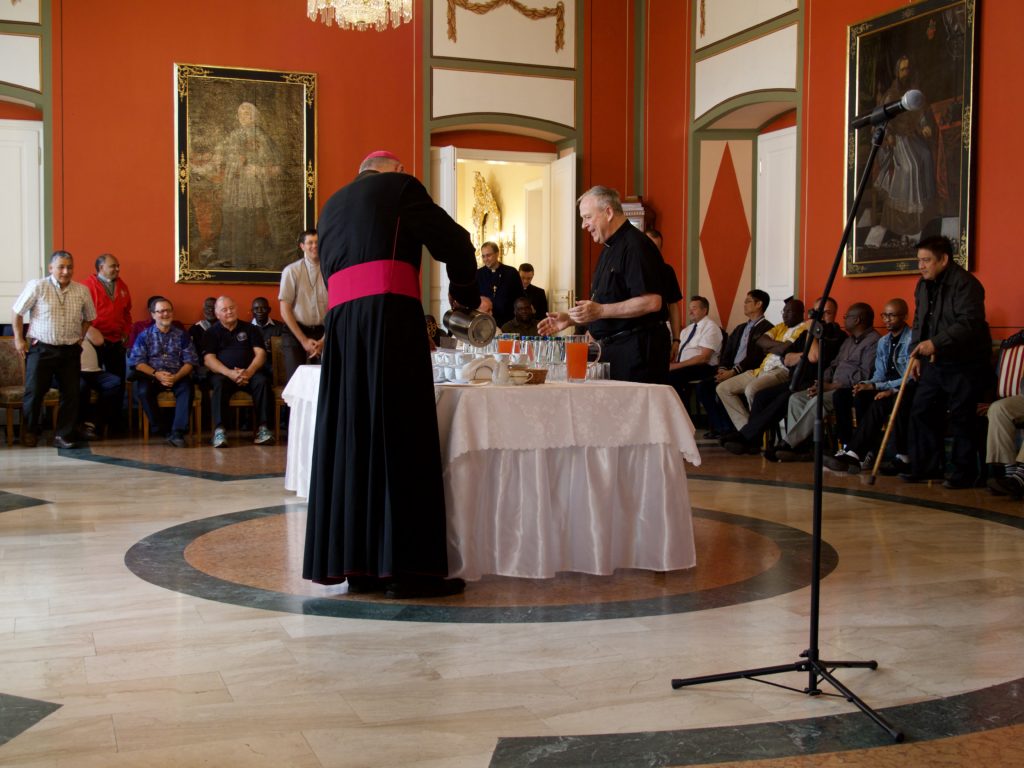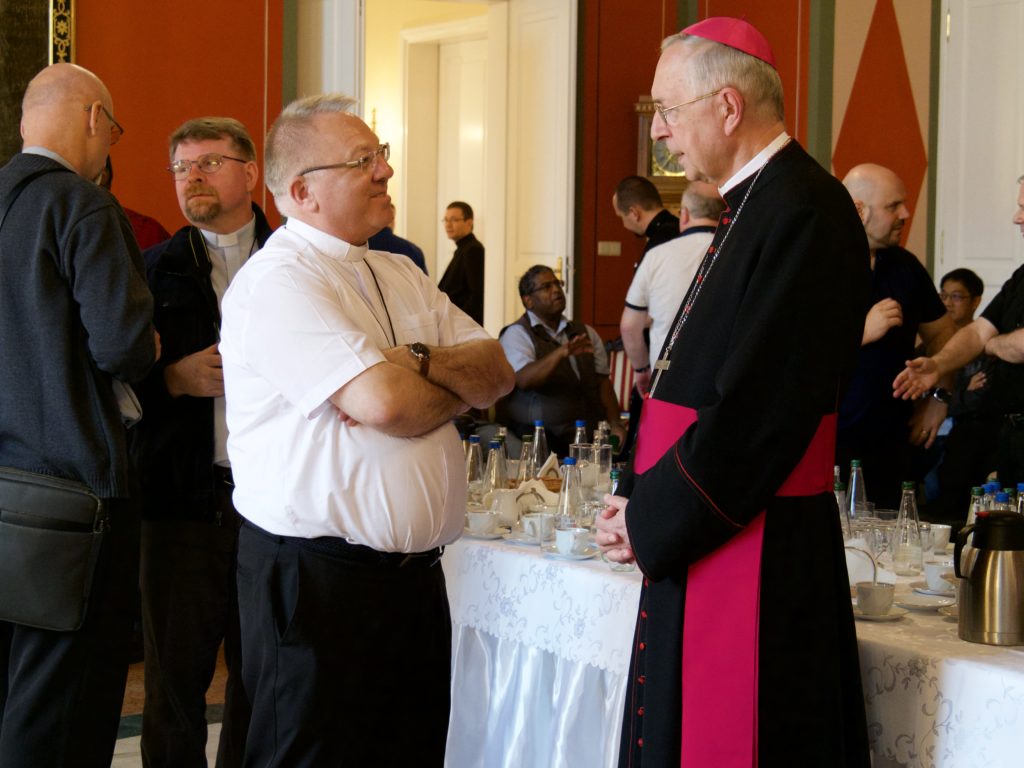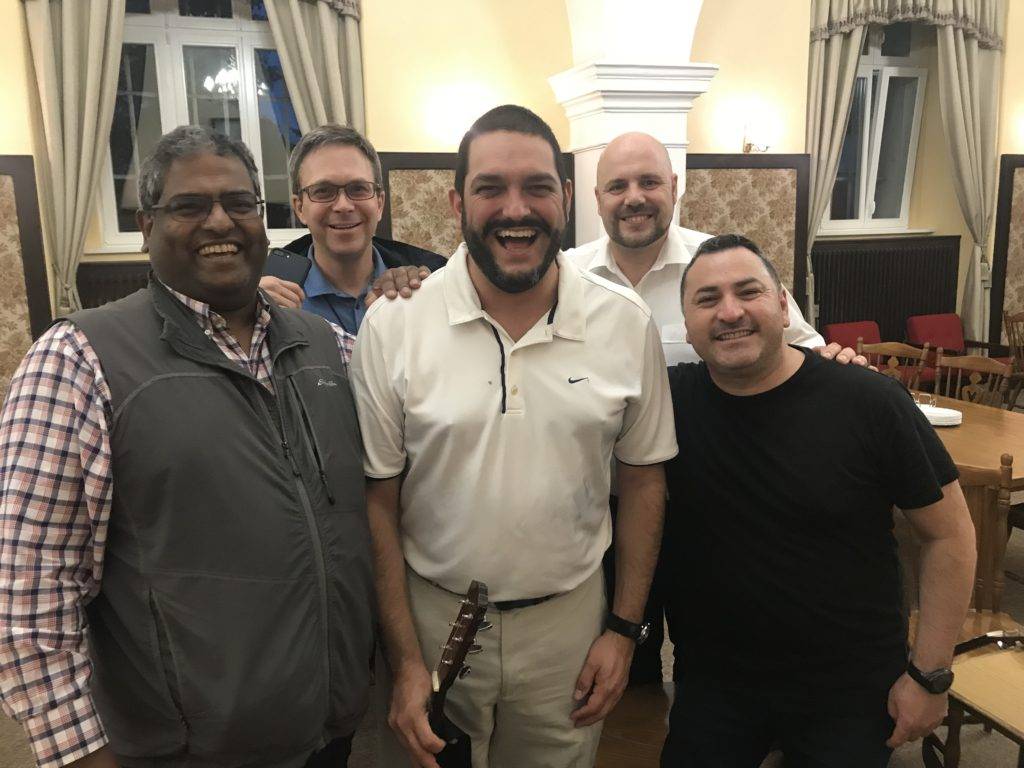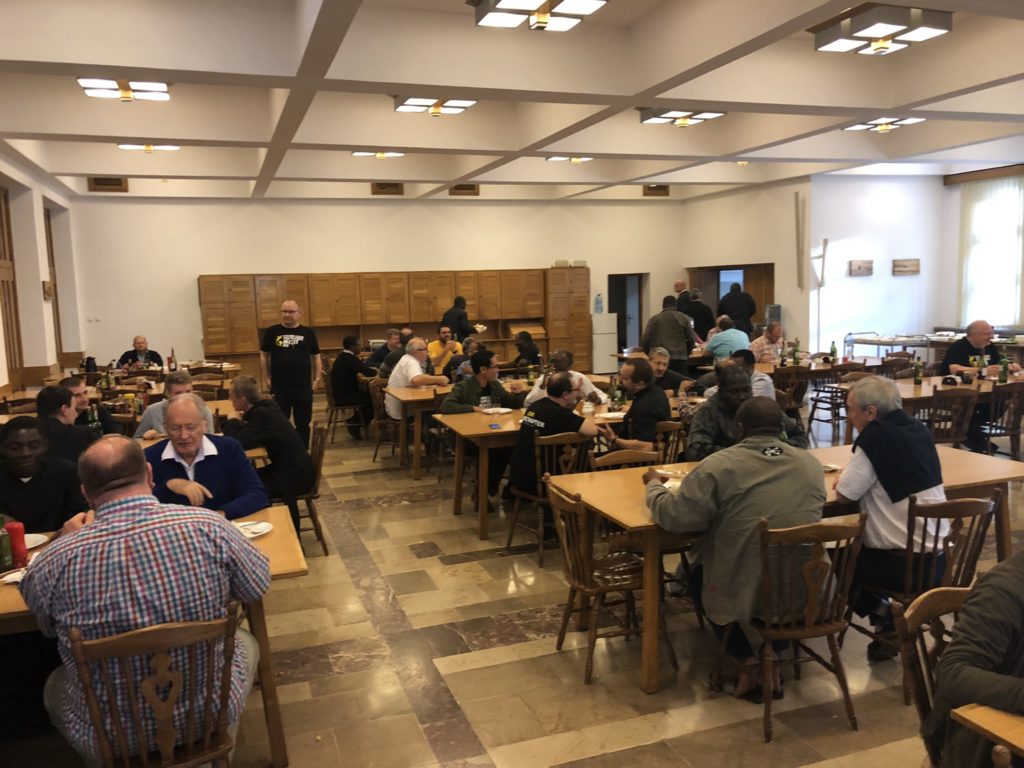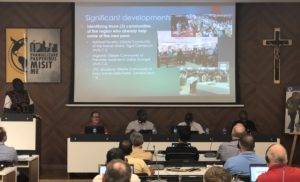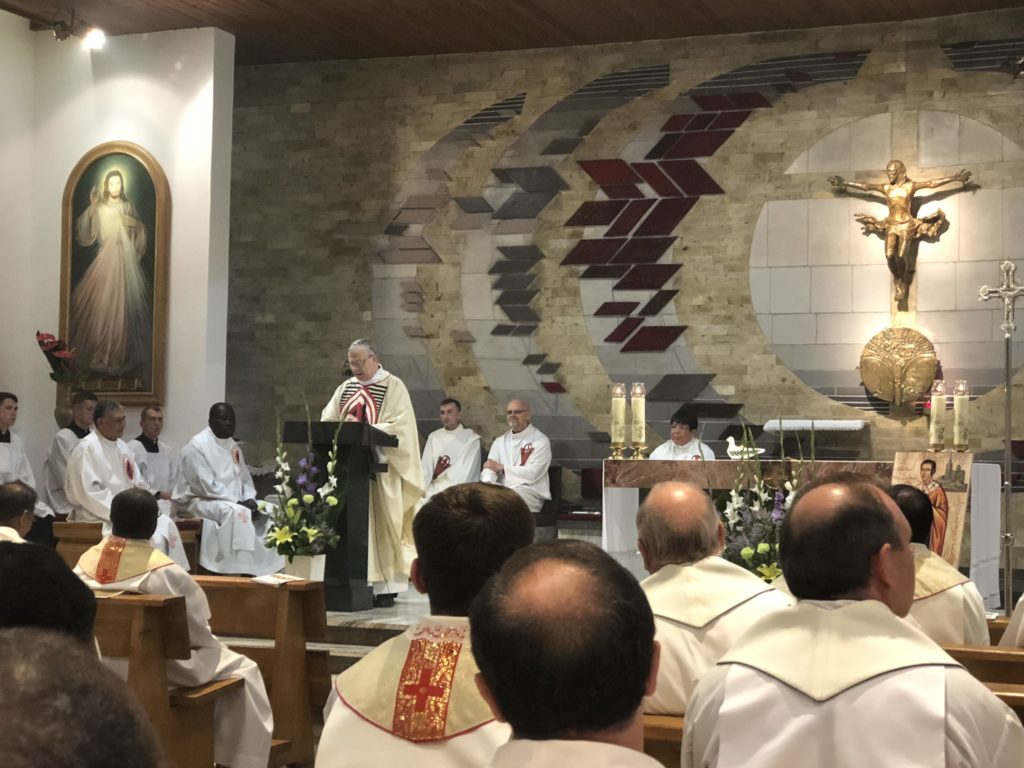The Inter Chapter Experience in Obra
June 29 & 30
I arrived in Poznan on June 29 and was happy to be met at the airport by Fr. Lukasz Krauze, a cheerful Oblate who teaches homiletics at the Polish Scholasticate, and who accompanied me on my visit to Poland in October 2017. With two Oblates who’d arrived from Cameroon, we found our car and started the 100 km journey to Obra, our home for the Inter-Chapter meetings.
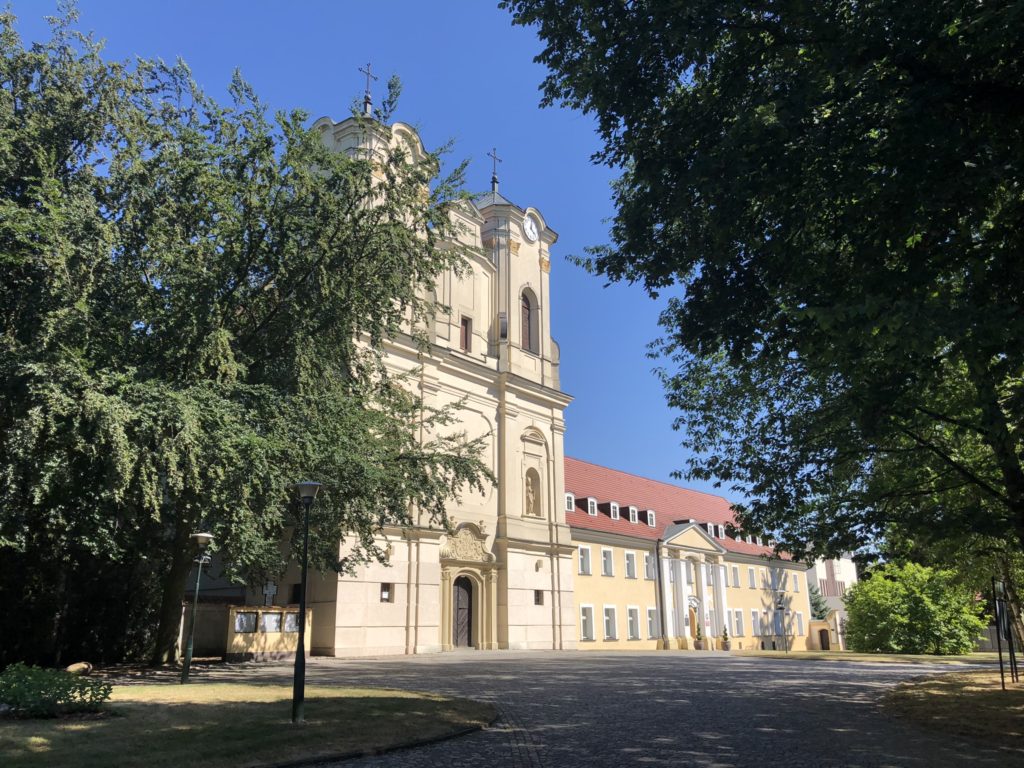
The Oblate Scholasticate in Obra, Poland. Today, about 35 Oblates study their philosophy and theology here.
As we left the air-conditioned airport, a wall of hot air hit us; Poland had not escaped the heat wave that covered most of Europe in the latter part of June, and it would grow even warmer in the coming days. One of the benefits of a summer-stay in a former monastery built over 200 years ago are the three-foot-thick walls, which kept the mid to high 30s temperatures at bay.
The view from my room during the Inter Chapter.
Ken Forster had arrived in Warsaw on June 28. After two days of sight-seeing, he made the four-hour train journey to Obra. By Sunday evening he, along with most everyone else had arrived – Provincial and Delegation superiors, along with the Mission superiors of Europe. By Monday morning, July 1, we were settled in and ready to begin the Inter-Chapter.
July 1
After the opening Eucharist, presided over by Paolo Archiati, we were welcomed to the Inter-Chapter by Fr. Louie Lougen, and to the Polish Province scholasticate in Obra, by the Provincial of Poland, Fr. Pawel Zajac.
One of the blessings of the Inter-Chapter is the opportunity it provides the leaders in the congregation to get to know one another, and so one of our first tasks of the day was to gather in small groups to respond to the following:
- Something “new” you have discovered about yourself since being a unit leader…
- Share on a “good” experience you had recently…
- Share on a “challenging” experience you had recently…
- What is your expectation from this Inter-Chapter?
There were informal opportunities for this sharing too. Coffee breaks and socials in the large community hall in Obra or walks each evening after supper on the beautifully maintained (by scholastics) grounds, provided ample time to talk about the realities and needs of our particular provinces, and of our experience of Oblate leadership today.
A further blessing of the Inter-Chapter was our prayer in common (see pictures top of next page). From the first day to the last, our morning and afternoon sessions were preceded by prayer; we prayed Oraison with the entire Obra Oblate community almost daily, and we celebrated daily eucharist by region, language groups, or together in the main chapel.
July 2 & 3 The second and third days were a time for presentations from the various regions of the Congregation (Africa-Madagascar, Asia-Oceania, Canada-US, Europe, Latin America and Caribbean). These provided a brief snapshot of the life and ministry of the Oblates and our partners around the world and, in particular, of each region’s growth and resistances in implementing the orientations of the 36th Chapter. Some examples of the growth are the increased internationality of our formation houses and the intercultural opportunities this allows, and a congregational re-commitment to ministry with youth; while resistances included the lack of development of interreligious dialogue in regions, our nascent but promising efforts regarding communications and use of social media, and the always thorny issues surrounding finances.
July 4
Four members of the Central Government; Fathers Ramon Bernabe, Cornelius Ngoka, Alberto Hauman and Marc Dessureault, reported on the Central Government’s efforts to implement the tasks given them by the 36th Chapter. An example is the creation of the General Mission Committee, whose work is an ongoing reflection on mission and ministry, and the development of resources to strengthen our congregational missionary response.
Fr. Cornelius reported at length on the fruits of the Year of Oblate Vocations (throughout 2017), and on developments in formation, such as the consolidation of formation houses, and bettering our efforts in ongoing formation for formators. Better training for formators in the area of interculturality was seen as a priority by all at the Inter-Chapter, given the growing internationality of formation houses.
General Treasurer, Marc Dessureault, reported on mission and finances. Of note are workshops at scholasticates on financial management and sustainability at: Cedara South Africa (2018), Yaoundé, Cameroon, and Latin America (2019), Manila, Philippines (2020). Marc also spoke of the manual developed by fundraisers and mission procurators to assist those units seeking financial assistance for projects and ministries.
Our Assistant General, Fr. Paolo Archiati, led an initial discussion on restructuration, highlighting three recent examples: the Mediterranean Province, Cruz del Sur in Latin America, and the Province of Southern Africa. He encouraged us to see restructuration not as a sign of diminishment, but positively, allowing for renewed discernment of our mission and more efficient use of our shared resources.
Toward the end of the Inter-Chapter, Fr. Louie Lougen added this reflection to the ongoing conversation around structures: …Rather than re-structuring or centralization or de-centralization, perhaps the invitation of the present moment is to a new coordination with the goal of better care for each other, the mission, and those we serve.
Paolo also spoke about the ongoing conversation around District Community, a subject of previous Chapters. The primary question is how this structure contributes to, or detracts from, the mission and community life of the congregation today.
July 5
The whole of this day was given over to a reflection on the progress of the congregation around safeguarding minors and vulnerable adults. Leading us through this important day was Suzanne Phelan, a child welfare consultant from Ireland, who has worked with the Anglo-Irish Oblate Province for many years. While respectful of the variety of cultures and experiences represented at the Inter-Chapter, and of the need to adapt policies to particular contexts, Phelan was clear that there are basic rights and principles that need to guide the policy development and practice of every Oblate unit:
- All children and adults at risk have equal rights to protection from harm.
- The rights of children and adults at risk must come first.
- Everybody has a responsibility to support the protection of children and adults at risk.
- Organizations, including churches, have a duty of care to children and adults at risk with whom they work, are in contact with, or who are affected by their work and operations.
- Each province has a responsibility to help partners meet the minimum requirements on protection.
- All actions on child/adult protection must be taken in the best interests of the child or adult concerned.
Suzanne went on to remind us that victims of abuse are part of the church, and they bring an important message. Our response must be to listen, with our first concern always being the welfare of children and vulnerable adults.
July 6
This first Saturday would be a half day of work. We shared the insights gained in the first week of meetings and then responded to the question: What has not been said about the last three years?
Some of our responses were:
- More time is needed in initial formation encouraging healthy sexuality and ensuring there are opportunities for candidates to speak openly.
- Do Oblates remain open to difficult missions today? To foreign missions?
- The term missionary does not belong only to those leaving their home province.
- Oblates need to be seen as supporting Pope Francis in response to unfair criticism.
- Documentation of our Oblate history, especially in the newer units, is needed.
The afternoon and evening were free. With the heat most Oblates stayed close to home, choosing to rest, catch up on work, or go for walks through the countryside and around the town of Obra.
July 7
On Sunday morning after breakfast, we boarded a bus and a few cars and began the journey to Poznan. Established in the 10th century, this city of over half a million people, is home to the Polish Provincial House. After coffee and a quick visit with some of the Oblates, we joined with the local Oblate parish for mass. Afterwards, a beautiful BBQ lunch was served in the garden by the Oblates of Poznan and the staff from the Provincial House and the parish.
Sunday mass at the Oblate parish in Poznan
After the eating came the dancing!
After far too much food, we made our way to the centre of Poznan for a quick visit to the historic core. Then, after a quick visit to the diocesan museum, we stopped at one of the oldest churches in Poland (10th C.), the Basilica of St Peter and St Paul.
Our last stop was the home (palace) of Archbishop Stanislaus, the current bishop of the Poznan diocese. He welcomed us in his reception hall and spoke of his deep appreciation of the ministry of the Oblates in the diocese. He then spoke quite humbly about the steps that he and the other leaders in the church there are taking in response to the ongoing revelations of sexual abuse in Poland.
July 8 & 9
With a week of the Inter-Chapter complete, we entered a more reflective time. Fr. Vlastimil Kadlec, a young Oblate from the Czech Republic, led us in a two day retreat. He offered rich content for our reflection, based on the story of Emmaus, and on his conviction that ‘the Oblate charism is alive, viable, and modern. One excerpt from my notes: ‘…on the road to Emmaus, the faith of the disciples is dimmed but not extinguished. Jesus asks his questions of them in an effort to re-ignite their faith… to deepen it. He tells them the story of Israel so they can see the present in a new light. This is what we are called to do each time we approach the Eucharistic table: to bring our darkness, crisis and doubt, and allow them to be transformed to future hope, based on God’s past faithfulness.’
July 10
Fresh from the retreat, we gathered to discuss regional priorities for the coming three years. The Canada-US Region named three:
- Priority 1: Work with younger Oblates in the region for greater collaboration, networking, on-going formation, developing leadership, with possible commitment to three, ministry projects in the region, as well as space for growing interculturality.
- Objective: September 2019 meeting of Younger Oblates in Mississauga (the second such regional meeting).
- Priority 2: Further development of an Oblate culture amongst youth and continue to introduce them to OMI regional ministries.
- Objectives: Respond to the invitation of the letter from the General Administration to promote a vocation culture in the provinces.
- Regional support for the regional youth rally scheduled for Our Lady of the Snows in Belleville in July 2020, exploring possibility of another at Cap-de-la-Madeleine in 2021.
- Priority 3: Commitment to discerning the future of the structures of the region, having already done much collaboration together, and further strengthening that collaboration.
- Objective: Present a plan for restructuring to the Joint Session in 2021.
July 11
The 37th Chapter will take place not in Rome, but in Nemi, a small town about 20 kilometers south of Rome. The theme of each Chapter is ultimately chosen by the Superior General, but in the final days of the Inter-Chapter, capitulars were invited to discuss and suggest possible themes. Here are just a few examples:
- Restructuring of initial formation;
- Mission in a post-Christian reality; recruiting and forming Oblates and laity for the mission;
- Mary our mother, and the Oblate family in today’s world;
- A synthesis between religious life and mission (see C.2 and Mark 3:14);
- Intercultural communities witnessing in an intercultural world;
- The Oblates hear the cry of the earth, the cry of the poor;
- Structures that allow a free flow of personnel and incorporation of laity as partners;
- Co-operators of Christ the Saviour within the Church in a fragile world, (Laudato Si);
- The Oblate vows as an essential dimension to live the charism today.
July 12 & 13
The final days of the Inter-Chapter were an opportunity to share information on a number of initiatives and upcoming events, a few being:
- Extraordinary Mission Month, declared by Pope Francis, to take place this October. The Superior General has been invited to write a letter to all Oblates for the occasion. A website at the Holy See has more information: october2019.va
- Peter Stoll, the General Councilor from the Asia-Oceania Region, spoke of remote preparations for a gathering of Oblate Lay Associates. The meeting will take place before the next Chapter in 2022 and be modelled on the 2015 Charism Congress. The tentative date is July 2-4, 2021.
- To commemorate St. Eugene’s mystical experience before the statue of the Blessed Virgin Mary in 1822, the Central Government proposes a Marian Year from 15 August 2021 – September 8, 2022. An interesting side note: the Congregation is in charge of about thirty Marian shrines around the world.
We also spent a significant amount of time evaluating the two-week gathering individually, and by region. Fr Luc Tardif, Provincial of Notre Dame du Cap, shared on behalf of Canada-US. Luc thanked the General Administration for their commitment to implementing the calls of the 36th General Chapter, and for the initiatives presented over these two weeks. He said the Canada-US region appreciated the atmosphere of simplicity and openness that was present throughout. He expressed the hope that the 37th General Chapter be organized in the same simple and open manner. The region hopes for a Chapter less procedural, with more storytelling and sharing amongst Oblates. He expressed the region’s concern that there is much to be done with restructuring, not only of units, but also of the General Administration. He encouraged the General Administration to work with imagination, courage and creativity in their preparation for the 37th General Chapter.
In Conclusion
It seems appropriate to conclude this account of the Inter-Chapter with a brief excerpt from the closing, informal address of our Superior General. Fr. Louie Lougen:
I would praise the Lord for our time together, we experienced the beauty of Oblate life, the commitment to our vocation. Francis, our Holy Father, said the most marginalised poor are the handicapped. They are invisible, sometimes living in terribly abusive environments: physically, emotionally, and sexually. I was touched yesterday during the prayer in the afternoon where we saw Fr. Wojciech on pilgrimage in Jerusalem with a group of handicapped persons. We are where we should be in many instances. Yet, we always have to ask ourselves: are we too comfortable? If so, we move on. I wrote in May, as it was mentioned, the Mediterranean province gave up a very nice parish where they have done great work, to move into the inner city and reconnect themselves to a more intense ministry with migrants. That was courageous. We have to see where we are being called today. The temptation is always to stay in Galilee where it is nice, we are popular, and everyone loves us. Jesus says we should go up to Jerusalem. I think that is our challenge to go from some comfortable areas to be with and for the poor. I think that’s all I have to say for now.
By Ken Thorson, OMI


